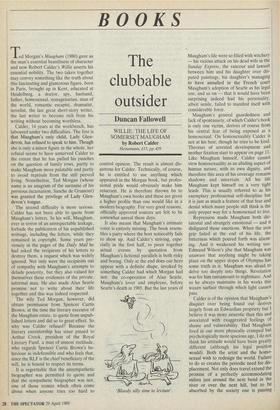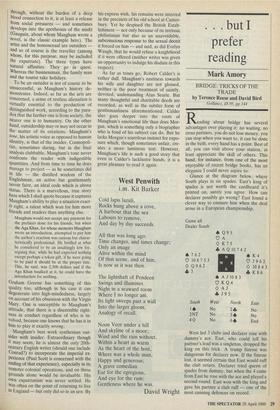BOOKS
The clubbable outsider
Duncan Fallowell
WILLIE: THE LIFE OF SOMERSET MAUGHAM by Robert Calder
Heinemann, £15, pp.429
Td Morgan's Maugham (1980) gave us the man's essential beastliness of character and now Robert Calder's Willie asserts his essential nobility. The two taken together may convey something like the truth about this fascinating and glamorous figure, born in Paris, brought up in Kent, educated at Heidelberg, a doctor, spy, husband, father, homosexual, nonagenarian, man of the world, romantic escapist, dramatist, novelist, the last great short-story writer, the last writer to become rich from his writing without becoming worthless.
Calder, 14 years at the workbench, has laboured under two difficulties. The first is that Maugham's only child, Lady Glen- devon, has refused to speak to him. Though she is only a minor figure in the whole, her refusal seems to have unnerved Calder to the extent that he has pulled his punches on the question of family rows, partly to make Maugham more palatable and partly to avoid reprisals from the still peeved living. Nonetheless, Ted Morgan (whose name is an anagram of the surname of his previous incarnation, Sanche de Gramont) was granted the privilege of Lady Glen- devon's tongue.
The second difficulty is more serious. Calder has not been able to quote from Maugham's letters. In his will, Maugham, ever in terror of an unrespectable leakage, forbade the publication of his unpublished writings, including the letters, while they remained in copyright. Some years pre- viously in the pages of the Daily Mail he had asked the recipients of his letters to destroy them, a request which was widely ignored. Not only were the recipients out of sympathy with Maugham's attempts to delude posterity, but they also valued for themselves these evidences of the private, informal man. He also made Alan Searle promise not to write about their life together and this was indeed respected.
The wily Ted Morgan, however, did obtain permission from Spencer Curtis Brown, at the time the literary executor of the Maugham estate, to quote from unpub- lished letters and did so to great effect. So why was Calder refused? Because the literary executorship has since passed to Arthur Crook, president of the Royal Literary Fund, a man of utmost rectitude, who regards Spencer Curtis Brown's be- haviour as indefensible and who feels that, since the RLF is the chief beneficiary of the will, he is bound to respect its terms.
It is regrettable that the unsympathetic biographer was permitted to quote and that the sympathetic biographer was not, one of those ironies which often come about when anyone tries too hard to control opinion. The result is almost dis- astrous for Calder. Technically, of course, he is entitled to use anything which appeared in the Morgan book, but profes- sional pride would obviously make him reluctant. He is therefore thrown On to Maugham's own books and these are given a higher profile than one would like in a modern biography. For very good reasons, officially approved sources are felt to be somewhat unreal these days.
It also means that Maugham's intimate voice is entirely missing. The book resem- bles a party where the host noticeably fails to show up. And Calder's striving, espe- cially in the first half, to piece together actual events by quotation from Maugham's fictional parallels is both risky and boring. Only at the end does our hero appear with a definite shape, invoked by something Calder had which Morgan had not: the co-operation of Alan Searle, Maugham's lover and employee, before Searle's death in 1985. But the last years of 'Bloody silly time to levitate'. Maugham's life were so filled with witchery — his vicious attack on his dead wife in the Sunday Express, the rancour and lawsuit between him and his daughter over dis- puted paintings, his daughter's managing to have annulled in the French court Maugham's adoption of Searle as his legal son, and so on — that it would have been surprising indeed had his personality, albeit senile, failed to manifest itself with considerable force.
Maugham's general guardedness and lack of spontaniety, of which Calder's book is only one victim, derives of course from his central fear of being exposed as a homosexual. On homosexuality Calder is not at his best, though he tries to be kind. Theories of arrested development and mother fixation start to appear on page 11. Like Maugham himself, Calder cannot view homosexuality as an abiding aspect of human nature, with its own dignity, and therefore this area of his coverage remains shadowy and uncertain. All his life Maugham kept himself on a very tight leash. This is usually referred to as his exemplary professional self-discipline but it is just as much a feature of that fear and denial which many people still think is the only proper way for a homosexual to live.
Repression made Maugham both dic- tatorial and strangely emotional — and it disfigured those emotions. When the iron grip failed at the end of his life, the bitterness which poured forth was alarm- ing. And it weakened his writing too. Edmund Wilson's jibe that Maugham was unaware that anything might be taking place on the upper slopes of Olympus has some truth in it. Maugham was afraid to delve too deeply into things. Revelation was for him tantamount to nightmare. And so he always maintains in his works this waxen surface through which light cannot pass.
Calder is of the opinion that Maugham's disquiet over being found out derives largely from an Edwardian propriety but believe it was more neurotic than this and associated with exaggerated feelings of shame and vulnerability. Had Maugham lived in our more physically cramped but psychologically more spacious age, I do not think his attitude would have been greatly different (although his legal position would). Both the artist and the homo- sexual wish to redesign the world. Failure to do so creates the periodic need for dis- placement. Not only does travel extend the promise of a perfectly accommodating milieu just around the next bend in the river or over the next hill, but to be absorbed by the society one is passing through, without the burden of a deep blood connection to it, is at least a release from social pressures — and sometimes develops into the apotheosis of the misfit (Gauguin, about whom Maugham wrote a novel, is the classic example here). The artist and the homosexual are outsiders — and so of course is the traveller (among Whom, for this purpose, may be included the expatriate). The three types have natural affinities. They go in quest. Whereas the businessman, the family man and the tourist take holidays.
To be an outsider is not of course to be unsuccessful, as Maugham's history de- monstrates. Indeed, as far as the arts are concerned, a sense of restless alienation is virtually essential to the production of distinguished work, according to the para- dox that the further one is from society, the nearer one is to humanity. On the other hand, outsidership may or may not occur in the matter of its creations. Maugham's tone, his artistic voice as opposed to human Identity, is that of the insider. Cosmopoli- tan, sometimes daring, but in the final analysis clubbable, Maugham's tone never Confronts the reader with indigestible quantities. And from time to time he does manage to project — as he sometimes did in life — the distilled wisdom of the Englishman, an active but gentlemanly savoir faire, an ideal code which is above status. There is a marvellous, true story here which I shall quote because it captures Maugham's ability to play a situation exact- ly right, a talent which won for him more friends and readers than anything else.
Maugham would not accept any payment for the prefaces done for his friends, but when the Aga Khan, for whose memoirs Maugham wrote an introduction, attempted to pay him the author's reaction was curious but charac- teristically professional. He bridled at what he considered to be an insultingly low fee, arguing that, while he had expected nothing except perhaps a token gift, if he were going to be paid it should be at the proper rate. This, he said, was 2,500 dollars and if the Aga Khan baulked at it, he could have the introduction for nothing.
Graham Greene has something of this quality too, although in his case it can degenerate into high-mindedness, largely on account of his obsession with the Virgin Mary. One is susceptible to Maugham's attitude, that there is a discernible right- ness in conduct regardless of who is in- volved, because one knows that he has it in him to play it exactly wrong.
Maugham's best work synthesises out- Sider with insider. Extraordinary though It may seem, he is almost the only 20th- century English writer (should one include Conrad?) to incorporate the imperial ex- perience (Paul Scott is concerned with the ending of that experience), especially in its remoter colonial operations, and on these grounds alone would be invaluable. His own expatriatism was never settled. He Was often on the point of returning to live m England — but only did so in an urn. By his express wish, his remains were interred in the precincts of his old school at Canter- bury. Yet he despised the British Estab- lishment — not only because of its intrinsic philistinism but also as an unavoidable, subconscious response to the sexual deceit it forced on him — and said, as did Evelyn Waugh, that he would refuse a knighthood if it were offered (neither writer was given an opportunity to indulge his disdain in this respect).
As far as tones go, Robert Calder's is rather dull. Maugham's nastiness towards his wife and daughter are not glossed, neither is the poor treatment of saintly, devoted, undemanding Alan Searle. But many thoughtful and charitable deeds are recorded, as well as the subtler form of gentlemanliness aforementioned. Calder also goes deeper into , the roots of Maugham's emotional life than does Mor- gan, which is something only a biographer who is fond of his subject can do. But he lacks Morgan's scurrilous instinct for expo- sure which, though sometimes unfair, cre- ates a more luminous text. However, Maugham's life is such a good story that even in Calder's lacklustre hands, it is a great pleasure to read it again.



















































 Previous page
Previous page